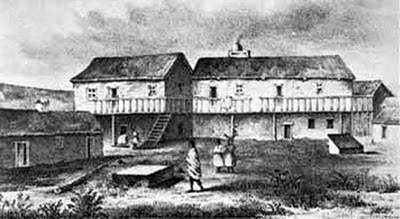 |
| Nathaniel Wyeth, 1840. Illustration for Harper's Magazine, 1892. |
However, pamphleteering by advocate Hall J. Kelley convinced Wyeth that he could make his own fortune by exploiting opportunities in the “Oregon Country.” (That region included today's Pacific Northwest, plus portions of British Columbia.) In early 1832, Wyeth organized a venture to pursue fur trading and trapping in the Rocky Mountains.
Unfortunately, the men he recruited in New England proved unsuitable, and six deserted even before Wyeth’s party started west from Missouri. Then, when they reached the trapper rendezvous, seven more men refused to continue with the expedition.
Wyeth’s party also had the bad luck to observe one of the most intense conflicts ever reported between trappers and hostile “Blackfeet” (actually Gros Ventre) Indians: the Battle of Pierre’s Hole [blog, July 18]. After visiting the Hostile’s redoubt the next day, Wyeth wrote, “It was a sickening scene of confusion and Blood[s]head. One of our men who was killed inside their fort we found mutilated in a shocking manner.”
Wyeth himself took some minor part in the battle, but his party of “Yankees” did not. Thus, his statement about “our men” was a sort of “editorial” license. His men did care for several wounded, one of whom died in their camp.
Wyeth was hard-working and conscientious, but in the end his lack of Western experience – and further bad luck – ruined this first expedition. The final, crushing blow came when the supply ship that was supposed to meet them on the coast struck a reef in the Society Islands and sank.
Still sure there was profit to be had in the fur trade, Wyeth put together another attempt in 1834. This time he also transported supplies west to be sold, under contract, to another trapping company.
As recounted in my December 20 blog about Trapper Osborne Russell, Wyeth’s customer reneged on the contract. Undeterred, he then built Old Fort Hall, in Idaho, to sell his supplies directly to the trappers and Indians.
Still, this venture also failed, largely because more-established competitors, the British-Canadian Hudson’s Bay Company (HBC) in particular, had a strangle-hold on the business. Within a couple years, Wyeth sold his Fort to the HBC.
 |
| Fort Hall, ca 1849. Library of Congress. |
In 1845, the Joel Palmer party [blog, August 23] passed by. Palmer observed, “The bottoms here are wide, and covered with grass. There is an abundance of wood for fuel, fencing, and other purposes. No attempt has, as yet, been made to cultivate the soil. I think the drought too great; but if irrigation were resorted to, I doubt not it would produce some kinds of grain, such as wheat, corn, potatoes, &c.”
Wyeth returned to the ice trade, paid off his considerable debts, and eventually went into business for himself. He left a substantial fortune when he passed away in August 1856. (Ironically, about the time Old Fort Hall was finally abandoned.)
| References: [B&W] |
| H. M. Chittenden, The American Fur Trade of the Far West, University of Nebraska Press, Lincoln (1986) |
| Nathaniel J. Wyeth, Don Johnson (ed.), The Journals of Captain Nathaniel J. Wyeth's Expeditions to the Oregon Country 1831-1836, Ye Galleon Press, Fairfield, Washington (1984). |
| Joel Palmer, Journal of Travels over the Rocky Mountains, 1845-1846, reprinted, Reuben Gold Thwaites (ed)., in Early Western Travels, Vol. XXX, Arthur H. Clark Company, Cleveland (1906). |